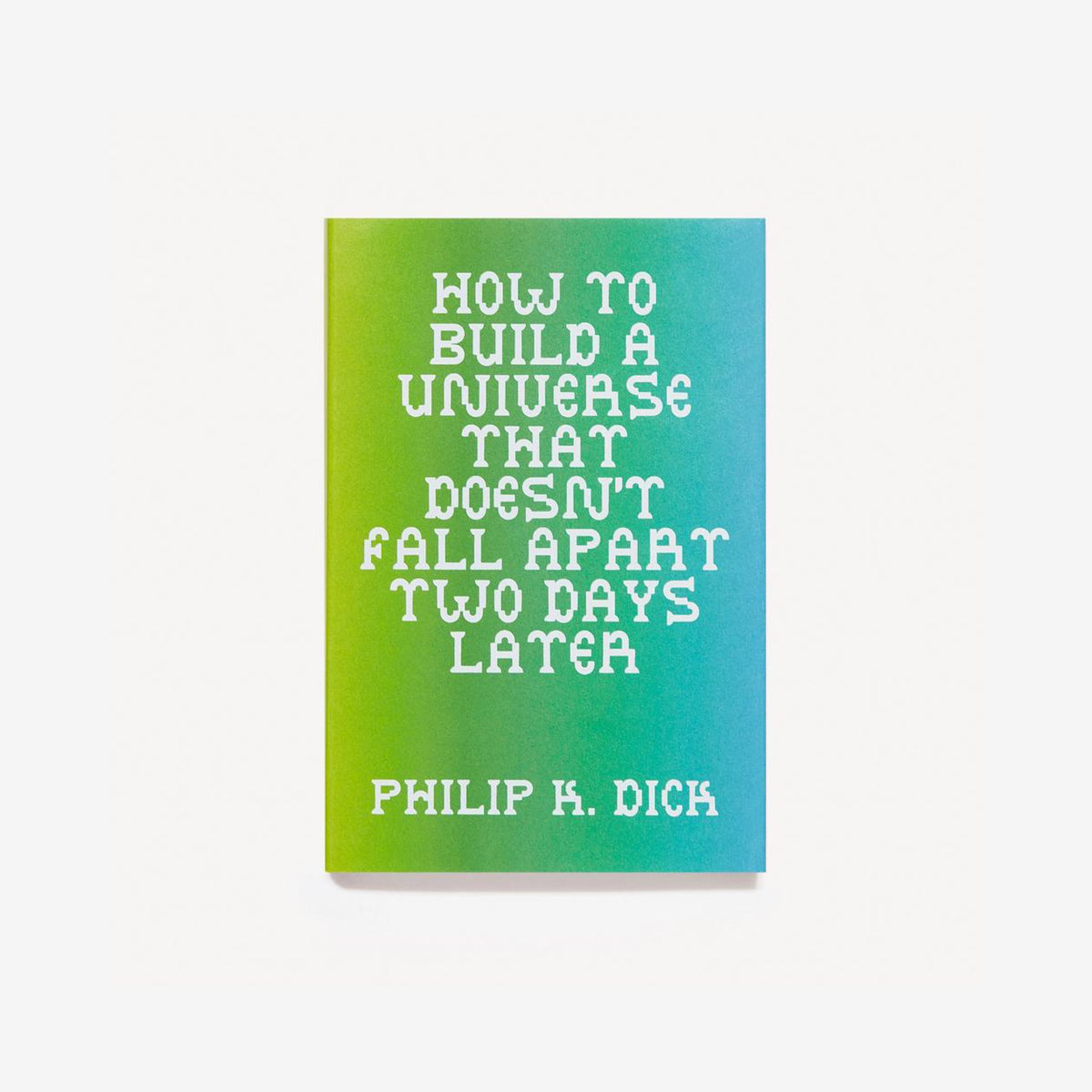
HOW TO BUILD A UNIVERSE THAT DOESN'T FALL APART TWO DAYS LATER by Philip K. Dick
Against the surreal backdrop of Disneyland in 1978, visionary science fiction author Philip K. Dick delivers a mind-bending lecture on the fragile nature of reality and the quest for authentic human experience in an increasingly mediated world.
With an introduction by David C. Krakauer.
Against the surreal backdrop of Disneyland in 1978, visionary science fiction author Philip K. Dick delivers a mind-bending lecture on the fragile nature of reality, the power of fiction, and the quest for authentic human experience in an increasingly mediated world.
Beside most aspects that define our modernity—AI, social media, increasingly sophisticated propaganda—can be heard the voice of Philip K. Dick, exclaiming with both amusement and concern: "I told you so." Lauded by the critic and theorist Fredric Jameson as "the Shakespeare of science fiction", Dick now stands as the best known science fiction writer of the 20th century. Dick's worlds and characters have filled our screens and dictated our imaginings of both future and present: his 1968 novel Do Androids Dream of Electric Sheep? became Ridley Scott's Blade Runner; his 1977 novel A Scanner Darkly was adapted into a film of the same name by Richard Linklater; and both Paul Verhoeven and Steven Spielberg have also adapted his writings into feature films. Something about Dick's worldview, extreme in concept and image yet always grounded in real anxieties, has seduced many of America's greatest storytellers.
How To Build A Universe That Doesn't Fall Apart Two Days Later is at once a lecture on the aims of writing science fiction, an essay on Pre-Socratic philosophers, and a reflection on similarities between the author's life and the Book of Acts. Dick's distrust of mass media information systems and those who operated them circa 1978 is so prescient that it seems the author may have uploaded himself into one of the androids in his fiction, so as to continue observing the world.
Dick is only a prophet, however, in the same sense that John of Patmos is: he does not offer architectural drawings of the future, but visions in blinding, pulpy colour which startle our eyes such that we can no longer trust our view of the present. How To Build A Universe That Doesn't Fall Apart Two Days Later is such a vision—both personal and intellectual, characteristically wild, stretching into the future and thousands of years into the past.
Philip K. Dick (1928-1982) was an American science fiction author whose prolific career spanned three decades. He wrote 44 novels and over 120 short stories. Dick's works often featured alternate realities, deeply paranoid protagonists and searching philosophical questions about identity and existence.
-
Title
How To Build A Universe That Doesn't Fall Apart Two Days Later
-
Author / Editor
Philip K. Dick
-
Publisher
Isolarii
-
Pages
120
-
Dimensions
73 x 108mm
-
Format
Softcover
-
Year
2024
Shipping Terms
Recommended last orders
United Kingdom: Tuesday 17 December
We highly recommend placing orders for Christmas as early as you can.
Delivery
We aim to process orders within 1–2 working days. Orders placed on a Saturday and Sunday will be processed from the next working day. If you need something in a hurry please call or email us before placing an order to ensure the item is in stock.
UK
All mainland UK orders are sent using Royal Mail, which usually arrives within 1–2 working days after despatch. We use Parcelforce and DHL on heavier or bulkier orders, which can take 2 working days to arrive. Royal Mail Signed For, Parcelforce and DHL all require a signature as proof of delivery. Please note that postage costs for addresses that are not mainland UK may vary.
European Union and Single Market
Please note that due to the introduction of the General Product Safety Regulation (GPSR) in December 2024, we are no longer able to ship to the EU and Single Market (including Northern Ireland). This does not affect items such as workshop bookings, Studio Passes, or Gift Vouchers.
International
Please note that LCBA cannot be held responsible for any import duties, taxes or delays in processing once your order arrives in-country. It is important that international orders include a contact telephone number and email address at checkout in the instance that the carrier needs to contact you for taxes and/or duties to be paid.
Out of Stock
We make every effort to ensure all products are in stock, but in the event of us not having your chosen product we will contact you and offer either a refund or a split- or later delivery if possible.
Returns
We hope you are happy with your purchases from London Centre for Book Arts, but if not, we can offer a refund on any item as long as it is returned in a saleable condition within 30 days of receiving your item. Please note that we are unable to reimburse postage costs for returns. For further information, or to make a return, write to us atorders@londonbookarts.org.